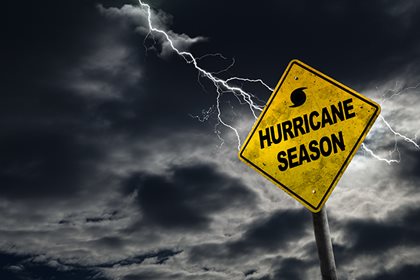Friday May 05, 2017
 The Atlantic hurricane season begins each year on June 1 and runs through November 30. This is the time when the eastern coastal United States may witness Mother Nature’s wrath through furious ocean-born storms that for some reason are given charming human names.
The Atlantic hurricane season begins each year on June 1 and runs through November 30. This is the time when the eastern coastal United States may witness Mother Nature’s wrath through furious ocean-born storms that for some reason are given charming human names.Hurricanes can bring tremendous physical destruction and financial ruin to a community association unless policies are put into place to prepare for the storms before they arrive, and to deal with the consequences afterwards. Every board whose association could possibly be impacted by a hurricane must have a hurricane preparedness policy to help maximize safety, minimize risk and ultimately, protect its operating budget too.
Just as important as having a policy is communicating the policy to your residents. Use every opportunity to provide details about your community’s hurricane policies and preparedness plans: emails, handouts at meetings, posted notices in common areas, social media and notices on your community website. Residents can’t be expected to comply with policies that they don’t know about.
Why does my association need a hurricane preparedness policy?
Not everyone has lived through a hurricane like Andrew or Katrina. Those who have are true believers in the terrific destructive power brought by high wind, rain and ocean storm surge.What has been made clear through repeated performances is that hurricanes, even those deemed “minor” as opposed to “catastrophic,” can harm associations—destroying buildings and landscapes, financial stability, property values, reputation and public image, and its aesthetics...all in the space of a few hours.
A hurricane preparedness policy will not prevent a storm from hitting your association, but it’s an important first step to readying your community before the hurricane hits. It will also spell out the steps residents should take during the hurricane and after the storm has passed, far into the insurance claim period.
Essentially, an effective hurricane preparedness policy will help protect an association’s financial stability by requiring that residents and staff take common sense precautions such as installing shutters and stowing or securing trash cans and yard furniture. Those are both simple tasks, but they will often limit damage and reduce unnecessary repair expenses after the storm. Your policies should outline details such as when shutters can go up and when they must come down, landscaping preparation guidelines for single family homes and all penalties for non-compliance.
What about seasonal residents who are away during hurricane season?
A hurricane preparedness policy should require all residents to participate, but knowing who is where is a constant challenge for community managers and board members. Alex Taylor, director of management for FirstService Residential, said that he runs occasional tests with residents to make sure he has their updated contact information and knows when their homes will be vacant. He also collects emergency contact information in case the resident cannot be reached. Once a storm is approaching, Taylor stays in constant touch with his flock, using email, phone, text, door knocks and FirstService Residential’s proprietary mass communication tool, Resident Alert™.Seasonal residents living elsewhere should be required to take the same precautions as those living in the community when the storm arrives. One un-shuttered window can provide an opening for hurricane-force winds to enter and rip off an entire roofline. Rain enters and before long, all connected units are full of mold. Consider storm season policies specific to seasonal residents, such as proving that they have contracted someone to put up shutters in their absence and bringing all small items indoors before vacating the property for an extended period. Always consult with your association attorney and property management company when writing new policies.
Communicating policies to seasonal residents requires extra effort. Board members and managing agents must work hard to reach every single resident and share the policy guidelines with them. Make sure that all seasonal residents provide updated contact information when they leave for the summer to help make this process easier.
How should you handle residents who don’t comply with the policies?
Residents who don’t adhere to the community’s hurricane preparedness policy do so at their own risk–and sometimes others’ as well. According to Maureen Connolly, vice president of FirstService Residential, “Each policy should also spell out the consequences to those who neglect or refuse to adhere to required precautionary steps. Fines are a deterrent commonly used to ensure compliance.”When a resident has failed to take the appropriate steps to prevent damage to their neighbors’ homes, lawsuits have resulted. The consequences of violating policies, including fines and possible civil legal action, should be clearly communicated to all homeowners and residents using all possible channels, well before hurricane season begins.
What about after the storm?
After the storm passes and winds are calm, boards look to their hurricane preparedness policy for guidelines on restoration of essential services, clean-up, repair work and the insurance claim process.“Right after a storm, residents turn to us for advice and guidance on who to call for repairs and how to navigate the insurance claim process. Our policy spells all of that out, and our community managers become a central hub for information,” said Taylor.
Working with a professional property management company can help your community mitigate risks and maximize safety during hurricane season. There’s hardly a better example in support of these goals than by having a strong hurricane preparedness policy in place and tactics for communicating with residents before, during and after a storm.
Now that you understand why hurricane preparedness policies are so important, learn about the steps to take pre- and post-storm with our comprehensive hurricane preparedness checklist.
To learn how a professional management company like FirstService Residential can support your community, contact a member of our team